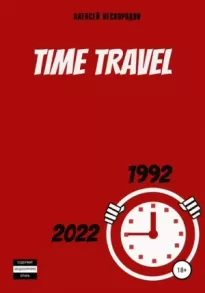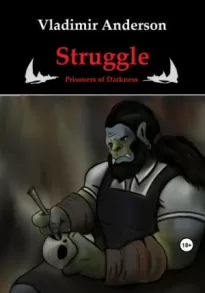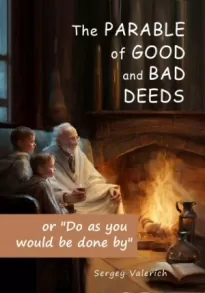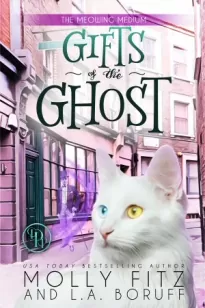TWICE IN TIME
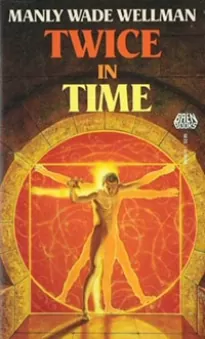
- Автор: Мэнли Веллман
- Жанр: Фантастика
Читать книгу "TWICE IN TIME"
CHAPTER II The Time Stream
Looking past her, Nostradame saw three men striding across the street, the foremost in a black-robe like a friar's, the other two with steel-faced jerkins and serviceable swords hanging at their belts.
"Into my study, child," he bade his visitor, pointing to the door. "Thence go into the kitchen and so out the back way to safety. If these are witch-finders indeed, and would accuse me, you must not remain, lest you, too, suffer unjustly."
She hurried where he bade her, and then he turned to face the three as they entered.
"And well, masters?" he prompted them genially.
The man in black, for all his clerical-cut robe, had a fierce sharp face and a fiercer, sharper eye.
"To business," he said. "I am Hippolyte Gigny, commissioned by church and king to seek out the rogues and destroyers who not having the fear of God before their eyes traffic with the fiend and do sorcery as witchcraft."
"Yours is a good trade," nodded Nostradame. "And how may I, a doctor of medicine, help you to your findings?"
One of the men-at-arms cleared his throat, and Hippolyte Gigny sneered.
"Here's a cool one, and shrewd! How do I say that I know you yourself are a wizard and as such gallow's-meat in this world and hell's-meat in the next?"
"I would say back that you are sadly wrong," said Nostradame, "and that the layer of the information is sadly a liar."
Gigny's teeth and eyes gleamed mockingly. "You mischief your case when thus you insult the informant—"
"Who is the Lady Olande de la Fornaye," finished Nostradame for him.
"You know, and a demon's voice must have told you, for but now did she accuse you," cried Gigny. "Knave, you are undone. Now shall we search your house. If you prove to have books of black art, charm, and instruments—"
He took a step toward the study door, beyond which Nostradame had all three of the articles Gigny had named as damaging. Nostradame shifted position to bar the witch-finder's way, and when Gigny would have persisted, shoved him back so that he staggered and almost fell.
"I am a scholar and a person of gentle blood," said Nostradame. "I will not be treated like a rabbit-poacher or a thief of handkerchiefs. Bring a writ of law before you think to search here."
"My writs of law are of steel," snarled Gigny. "Aho, you two! Draw on this saucy challenger."
The men-at-arms drew, and Nostradame leaped quickly to the wall where hung his own straight sword with its cross hilt and brass mountings.
"Lies the wind at that door?" he said, with sudden gaiety. "Come, then, both of you. I ask only a fan-stage and no favor."
His own blade rasped out of its sheath. In a trice he had parried the stroke of the first man to reach him, then a darting threat from his point caused the second to give back. At once the pair saw that they had their hands full—Michel de Nostradame had been a strong swordsman from his student days at Montpellier, and had not let his skill rust for want of exercise.
A little of the stout German cut-and-thrust was in his method, and more than a little of the Italian school, which makes the blade both attack and defense. Two though they were against him, and mailed where he was but gowned, they strove their best and could no more than hold him in check.
But Gigny had rushed past the three battlers, to the door from which Nostradame had thrust him. He tore it open and stepped through. A moment more, and he yelled aloud in coarse laughter, then turned to emerge.
"Cease," he cried. "A truce, a truce! Put up swords, I pray!"
Obediently his servants gave back, lowering their points, but Nostradame remained on guard. His brilliant eyes were hard and angry.
"God's wounds, I see now this gentleman's wizardry, and would we all could learn from him," sniggered Gigny. "Messire Nostradame—that is your name? You had all good reason to deny us our searching. I have been precipitate here, and a little offending—"
"More than a little," growled Nostradame.
"Then I cry pardon, and do you cry forgiveness." As Nostradame, too, grounded his sword-point, Gigny came close, nudging the doctor as though to say they shared a pleasant secret. "I am a man of the world, sophisticated—I can see why the charge was placed. One lovely lady ousted from your favor by another— forgive me, I beg again, and also again—send us all such wizard powers, and eke such familiar spirits!"
And he walked out, with a last leer over his shoulder, waving his servants along with him. Nostradame leaned a trifle on his sword, so that the good steel bent springily, and frowned. Then he turned toward the open study door, to see what matter had so changed the tune of the witch-finder.
Of his books, the bronze tripod stool, the water-basin, the forked rod of laurel, his robe with the strange symbols, nothing showed. These had been gathered under his desk, over which had been thrown the cloak of Anne Poins Genelle. And on a couch in a corner she half reclined, the low-cut collar of her gown twitched down so as to reveal a bare shoulder— slim but not bony, Nostradame saw at once. She was the picture, most skillfully posed, of a luresome lady surprised in an intrigue.
"From my heart's depth do I thank you, child," said Nostradame earnestly. "They are gone—"
She rose, twitching her gown into place again.
"It was all I could think to do in that short time. To hide the things they must not find, and to appear to be your reason for secrecy. You are not angry with me?"
"I dread only that you may have brought undeserved shame on yourself. As God is my judge, I am no wizard or devil-companion. But how could you know, and be moved to help my helplessness?"
"That." She pointed to the sword he still gripped. "It's hilt—a cross, and set with a holy name. I read it cut upon the brass as it hung on your wall. And in here—" She pointed again, to the crucifix on the wall, the Madonna on a shelf. "In the presence of the true faith, how could black magic work? Surely, messire, you seek knowledge, but not evil. If you work miracles indeed, right so did the holy saints. I would be your friend."
"You are my friend and my rescuer." He laid the sword on the couch, and stooped to kiss her little hand. In France of 1547 that was a gesture no more than well-bred and admiring, but her fingers stirred in his. The heart of Nostradame, mature and mentalized scholar, was touched. "And how," he continued, "may I serve you in some small way to pay in part my great debt?"
"Be only what you are," she said.
"What do you know of what I am?"
"Perhaps," murmured Anne Poins Genelle, "I, too, have more senses than five. Perhaps I am aware of things beyond this small space and time in which we huddle."
"Child!" In his sudden blaze of feeling, he clutched her forearms. They were small in his grasp, like the forks of the ceremonial laurel rod. "Are you telling-me that you, too, know the hour of sight?"
The suddenness of his cry and movement made her shrink in his clutch, and he let go and stepped back.
"Indeed, I cannot say what I meant," she said, recovering. "I only felt what you tried to say to my cousin, Lady Olande, and could understand when she could not or would not. I'll stay a moment, if you talk to me, messire."
He smiled at her. He had not felt so comradely toward anyone in years. Standing over her in his gown of dignity, he was taller than one might think, so broad was his body and so easily did he carry its breadth.
"I think the more, and speak little," he temporized. "Would that speech were as free as thought. Some day it may come to that."
"A prophecy."
"A hope." He led her to the desk, and lifted from it her mantle. There lay his papers. "You deserve my trust, Lady Anne. And, faith, perhaps I need one to listen and believe and understand. Here. Read this first of my quatrains."
He handed the sheet to her. She read aloud, softly:
" 'Seated within my study-room at night
Alone upon a tripod stool of brass,
I saw from out the silent dark a light
That mirrored magic scenes as in a glass…' "
"That explains how visions come to me," he told her. "Thus I begin my record. How came I thus to study and work? Perhaps by way of my fathers—my grandfather read white magic, and urged me to the like. When I went to Montpelier, to the university founded long ago by fugitive wise Arabs, I learned foreign languages and foreign arts, along with medicine. Books of wisdom did I con in the library— Roger Bacon of England, Albertus Magnus, and certain scrolls by Eastern magi. Yet I did hesitate over their teachings. I think," and he sighed, as if weary a little, "that the hour of sight forced itself upon me."
"It came whether or no?" she suggested; and when he nodded, "When?"
"Within this year. I had returned from my last intention at public honors—I had been invited to Lyon, as once before to Aix, where I did some service during the plague year. Coming back, I thought to consider worldly wealth and fame a vanity, and to live and study quietly. Then, it began. By chance, or by another will than mine, I did as the verse tells, after the manner of the soothsayers of the ancient Brancchi."
He explained that classical formula of action—the forked rod, the basin redolent of herbs, the moistening of the robe's hem, the tripod stool such as once accommodated the oracle at Delphi.
"By heaven, the ancients knew rare and curious things. Who can say that this wonder is not science? We once would have thought printing sheer magic, and eke gunpowder. Five hundred years gone, my medical studies would have seemed witchcraft. In any case, a vision came, of another time and place. Then others—but read."
He handed her another quatrain:
The coffin sinks within the iron tomb
Where dead and still the King's seven children lie,
While ancient ghosts rise from the hellish gloom
And weep to see their withered fruit thus die.
"A dubious mystery," said Anne, giving the paper back.
"Because I dare not set down plain what I see, or how," he replied. "What would be my shrift, if witch-finders like that vagabond Gigny should read a true account? I made the verse for my vision of an iron-grilled tomb, marked with a lion for coat-of-arms—"
"The lion of the Valois," said Anne at once. "Of our comely king, the Second Henry. I have been to court with my cousin, only three months gone, at his coronation. Henry is a stout rider and weaponer. He tilted bravely against the best of his nobles, wearing the lion upon his surcoat, and on his head a gold-visored helmet—"
"Gold visor!" interrupted Nostradame in his turn. "Heaven's grace, it is what I saw, and indeed only the king may wear such brave armor. Lady Anne, read this. I saw it at the dawn just past."
She read the quatrain he had written that day, and he told her more fully what the mist had drawn away to show him. Anne's slim young face was grave.
"Now, here's a sad wonder," said she when he had done. "It was foretold the king in his childhood that he would die in a duel. His mother scorned the word, for who would dare challenge a royal prince? But if it falls out as you say, in a joust or tourney—when will this happen?"
"I cannot tell. The visions come not in any order of time, though I see and set down things that help me decide. Perhaps the stars in the heavens are shown me, or I hear a word. For this one, I should say the king seemed older than now—a good forty years turned."
"And he is twenty-eight," supplied Anne. "Twelve years hence, or thereon. The year of 1589? And your other vision was of the death of his house at Valois. Will you tell him these sad things?"
"I would need to know him well before making so baleful a prophecy. Remember your cousin's rage at me. I have no fame or position—"
"But you will gain both," Anne told him, with an earnestness so great that it seemed to take her breath.
"You have prophecy for me."
"No, only faith. It is you who see everything and of every time. I am not skilled nor wise in magic. But I feel sure of your future."
"Child, your words make me feel sure, too." He took her hand, in an honest impulse of inspired comradeship. "Happy the man whom you love."
"I love none, messire. My father was gentle, but poor. On his death I came to live with the Lady Olande. Think you she listens to any talk of love save for herself?"
That was enough to sketch for him the life-picture of a poor relation in the home of a woman who ruled her dependents like a tyrant. Pitying Anne, Nostradame spoke of other glimpses he had caught into the future, and of what they seemed to tell of the world to come. Her interest was for France, and he spoke of the rise and fall of powers, of rebellions and defeats and triumphs; in particular of a strange little ruler, a sturdy short man who wore a great three-cornered hat, who for a time would hold all Europe but whose bloody rule would bring the world into arms against him, and finally cause his downfall.
"You speak of other centuries? How clearly do you see distant times?"
"Clearly. Too clearly. Child, it is a horror to see the wars of that far future. Fire from heaven, wasting away cities, the march of great engines and vehicles, guns as large as giant trees, the advance and retreat of armies as numerous as the generations.
"Man shall learn," said Anne, with her air of confidence. "Your prophecies shall teach them."
"How? The future is as rigidly set out as the past."
"Is it so? Perhaps you see but moments, and if men take warning they will be able to change other future moments, for the better."
The two of them could have talked for many hours, but Anne feared what her absence at the house of her cousin might bring. She told him good-day, and again he kissed her hand, which this time did not tremble but squeezed his. And when she was gone, the house and the study seemed to tremble in an afterglow of her presence.
Nostradame grinned ruefully in his beard. Was he falling in love, and with a slender girl, little more than a child? He had thought himself past such things, since the death of his wife. He had mourned her sincerely, that lost wife. She had been kind, loyal and loving, for all she had not once shown interest or even curiosity over his studies of magic and future-reading. Anne Poins Genelle, in two brief hours, had proven herself more understanding and sympathetic.
The afternoon occupied him with another series of patients. He fared out to visit two sick merchants, and found one of them surly, the other depressingly quiet and complaining. He came home to a simple evening meal, and with the fall of night repaired to his study. From the hiding into which the Lady Anne had thrust them he dragged stool, basin, diving rod and robe. Quickly he made preparations for the hour of sight.
He confessed himself weary from the day's adventures. Indeed, he sagged rather than sat on the tripod, but a vision was coming. In his ears rang a faint cry, the cry of a child, and then he saw Anne, as she might be a year or two older, holding in her arms a swaddled infant. She smiled and whispered, and the cries ceased. Then she turned her face upward, and lifted the baby to show it to someone. A figure stood beside her chair, and bent tenderly over mother and child. It was himself, in his doctor's gown and his mood of happiness—he, Nostradame, with a hand out to Anne's child in the gesture of a father, proud and joyous—
He started. That had been a dream, not a vision, for he had dozed on the tripod. For an instant he pondered that the ancients had found truth in dreams, too. And then the forked rod was trembling in his hands, and his every fiber grew taut and tense as, in the darkness, a screen of mist made itself.
This time he heard before he saw, a voice muttering a single word, muttering it again. He spoke the word in his turn—
The mist was clearing, and Nostradame shuddered with a prescience of terror, he knew not what. And then it was gone, mist and voice and all, before completion. His mind had been snatched back to his study by the loud staccato of a knock from the front of the house.
Quickly he rose, doffing robe and laying down rod, and walked into his consulting chamber and to the front door.


